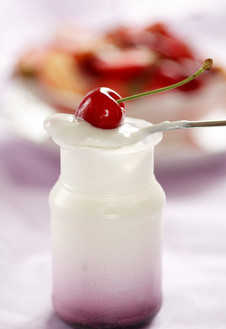 Yogurt Adsa lot of useful substances (vitamins, calcium and phosphorus, easily digestible proteins), as well as, thanks to the live microflora contained in them, which activates the immune system. In Russia, a lot of fermented milk products are traditionally produced - kefir, various types of yogurt (ordinary, fermented baked milk, varenets), acidophilic products, cottage cheese, sour cream, etc. The common thing in the manufacturing technology of these products is that they are made from milk or cream by fermentation ... The difference is that the starter cultures consist of different cultures of lactic acid bacteria (acidophilus bacillus, lactic acid streptococci, Bulgarian bacillus, etc.); in addition, cultures of milk yeast can also be added. The fermented milk product yogurt, the European synonym for the Ossetian word "kefir", really has healing properties, but only if the content of biologically active (living) bacteria in it is not lower than a certain value (according to international standards in any lactic acid bacteria should be at least 106 / ml). Real "live" yoghurt has a shelf life of no more than a week and should only be stored in a refrigerator at a temperature not exceeding 80 ° C. Long-term storage yoghurts (as a rule, imported) undergo heat treatment, during which the beneficial bacteria contained in them die.
Yogurt Adsa lot of useful substances (vitamins, calcium and phosphorus, easily digestible proteins), as well as, thanks to the live microflora contained in them, which activates the immune system. In Russia, a lot of fermented milk products are traditionally produced - kefir, various types of yogurt (ordinary, fermented baked milk, varenets), acidophilic products, cottage cheese, sour cream, etc. The common thing in the manufacturing technology of these products is that they are made from milk or cream by fermentation ... The difference is that the starter cultures consist of different cultures of lactic acid bacteria (acidophilus bacillus, lactic acid streptococci, Bulgarian bacillus, etc.); in addition, cultures of milk yeast can also be added. The fermented milk product yogurt, the European synonym for the Ossetian word "kefir", really has healing properties, but only if the content of biologically active (living) bacteria in it is not lower than a certain value (according to international standards in any lactic acid bacteria should be at least 106 / ml). Real "live" yoghurt has a shelf life of no more than a week and should only be stored in a refrigerator at a temperature not exceeding 80 ° C. Long-term storage yoghurts (as a rule, imported) undergo heat treatment, during which the beneficial bacteria contained in them die.  More honest are these yogurts (they are also called“Dead”) would be called yoghurt-based desserts or drinks. Fresh fruit is not added to yoghurts, since the fermented milk environment does not tolerate them, but they add either regular syrup or pieces of canned fruit. Most of the widely advertised yogurts are nothing more than kefir, filled with synthetic "improvers", flavors and conservatives (food supplements with the E index), instead of sugar, the aspartame sweetener (E-951) is often used, which often cause allergies, especially in children. Therefore It is better to buy fresh, natural, local yogurts without any additives.
More honest are these yogurts (they are also called“Dead”) would be called yoghurt-based desserts or drinks. Fresh fruit is not added to yoghurts, since the fermented milk environment does not tolerate them, but they add either regular syrup or pieces of canned fruit. Most of the widely advertised yogurts are nothing more than kefir, filled with synthetic "improvers", flavors and conservatives (food supplements with the E index), instead of sugar, the aspartame sweetener (E-951) is often used, which often cause allergies, especially in children. Therefore It is better to buy fresh, natural, local yogurts without any additives.

Making Money with Desserts: Success Stories
Yevhen Polishchuk (Fedutinov) instagram: @ evgeniyafedutinovavk.com / janeshomebaking– It all started with baking for relatives and friends. Gradually, she began uploading photos of her baking to Instagram, and orders began to come in. I made my first cake to order on October 13, 2014, and a little earlier I started making macarons and cupcakes. We can say that the business "found me myself", I am very [...]

Soups are cold recipes with photos
Cold cucumber soup with yogurt and lemonSorbet from La Taverna restaurant chef Alexander Zhurkina Photo: Getty Images Ingredients: Yoghurt without additives - 125 gCucumber - 150 gSorbet lemon / lime - 50 gCool shrimp - 24 gFresh ginger - 1 gLime lime - 5 gFresh orange juice - 5 gPetroshka - 1 g pink - 1 gCress salad - […]

barbeque kebab
Pork tenderloin glaze Photos: Dmitry Bayrak / dbstudio Cooking time: 20 minutes + time for pickling. Calorie content: 454 kcal per 1 serving. For 4 servings: 4 pork tenderloin (about 300 g each), 1 onion, 2 cloves of garlic, 1 tsp. lemon peel, 1 tsp. lemon juice, a pinch of ground cumin, coriander and turmeric, 1 tbsp. l vegetable [...]

Pierre Duacan: dietary recipes: Ducane diet
Beetroot Photo: Season'S, Luxury Hotels Representation You will need: · Boiled beets - 60 g · Fresh cucumbers - 20 g · Red radish - 20 g · Green onions - 10 g · Egg - 1 pcs · Mineral drinking water - 200 g · Salt - 1 g Ready: · Boil egg and beetroot. · Grind cucumbers, radishes and a part of beets. Putting everything [...]





